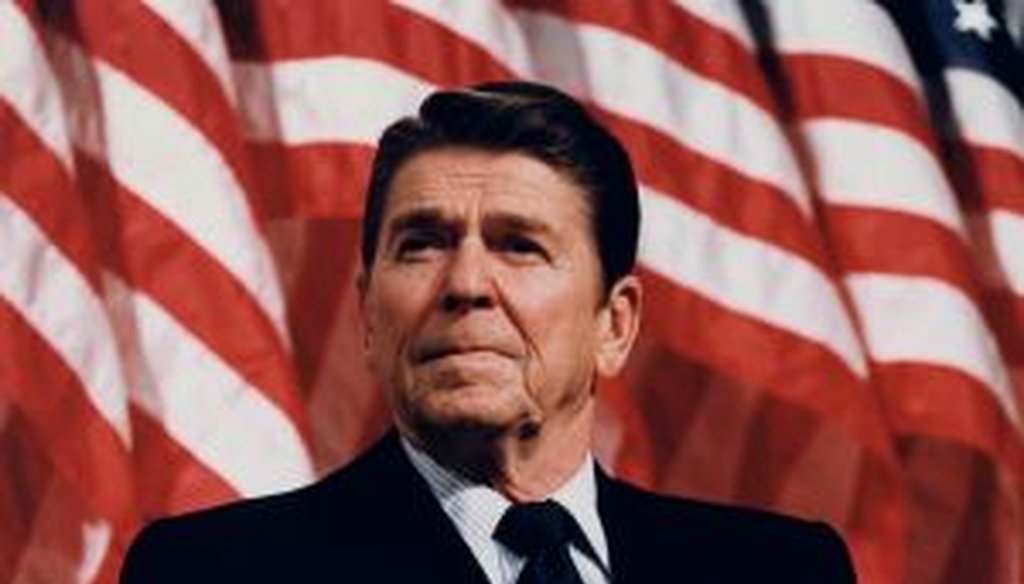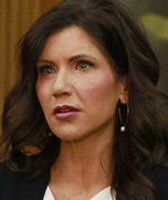Stand up for the facts!
Our only agenda is to publish the truth so you can be an informed participant in democracy.
We need your help.
I would like to contribute

Ronald Reagan is an icon for Republicans. How has Mitt Romney approached his legacy over the years? (Image from National Archives)
Mitt Romney once distanced himself from Ronald Reagan, but no longer
Ronald Reagan is the ultimate icon for Republicans. But has Mitt Romney flip-flopped on his support for the Gipper?
The flip-flop charge was raised by the Democratic National Committee in an video advertisement. Separately, one of Romney’s Republican primary opponents, Newt Gingrich, charged that Romney has demonstrated insufficient warmth for the late president.
In this item, we’ll ask whether Romney has flip-flopped on his degree of support for Reagan.
We’ll start by noting that the Flip-O-Meter rates politicians' consistency on particular topics from No Flip to Full Flop. The meter is not intended to pass judgment on their decisions to change their minds. It’s simply gauging whether they did.
What Romney said during his 1994 Senate campaign
In 1994, when Romney was challenging Sen. Edward M. Kennedy, the two had a debate in which Kennedy, a liberal Democrat, claimed that child poverty rates rose during the Republican administration of Reagan and his vice president, George H.W. Bush.
"Under the Reagan/Bush economic programs, under the economic programs you want to return to, the total number of children that are living in poverty, the total number of children out of wedlock -- this has happened, you know we’ve had Republican presidents during this period of time and the cutting back of support systems for children and most of all for families to get jobs," Kennedy said. "If you’re not going to provide a climate and an atmosphere for men and women to be able to work and provide for their children, you’re going to see the breakdown of the family as well."
Kennedy said discussions about supporting families shouldn’t be used to score "political hits," prompting Romney to fire back that he wasn’t politicizing the issue -- Kennedy was.
"I mentioned nothing about politics or your position at all," Romney said. "I talked about what I’d do to help strengthen families, and you talked about Reagan-Bush. Look, I was an independent during the time of Reagan-Bush. I’m not trying to return to Reagan-Bush."
We looked and couldn’t find any other references to Romney distancing himself from Reagan, beyond the 1994 debate comment. Still, this example does strike us as a high-profile and unmistakable case of rhetorical distancing on Romney’s part.
Romney’s statements as a presidential candidate
By the time Romney began running for president -- which meant courting a staunchly conservative Republican base, rather than independents and Democrats as he had in Massachusetts -- Romney’s tone changed.
During his first presidential campaign in 2007, Romney blasted primary rival John McCain for voting against President George W. Bush’s tax cuts during a campaign event in New Hampshire.
"That's failing Reagan 101," Romney said, holding up Reagan as the standard to which Republicans should aspire.
Then, in a debate in October 2007, Romney was asked whether the primary candidates would support the Republican nominee if it was someone else. Yes, Romney said, then added, "I want that nominee, however, to come out of the same mold as Ronald Reagan."
Romney has continued to offer praise of Reagan as the 2012 campaign approached.
In May 2010, Romney spoke at the annual Reagan lecture at the Reagan library in Simi Valley, Calif. He was talking about America’s position in the world.
"I’m optimistic about the future because I recognize that there is a growing awakening among the American people that this administration has put us on the wrong track and that the principles that Ronald Reagan espoused are as true today as they were when he spoke them."
After some applause, Romney continued by elaborating on Reagan-like policies emphasizing low taxes, balanced budgets and strong families. While speaking about the need to keep America strong for the sake of world peace, he paraphrased "that wonderful line" of Reagan’s:
"(Reagan) said, ‘Of the four wars that were begun during my lifetime, not one of them was begun because America was too strong.’ And he’s absolutely right," Romney said.
We found other examples of Romney's fealty to Reagan's legacy:
• When he proposed a detailed economic plan last year, Romney included a provision for a new "Reagan Economic Zone," an international free-trade area designed to reward nations that have "embraced free enterprise and open markets."
• On Dec. 16, 2011, at a Fox News-sponsored debate, Romney referred to Reagan in explaining his change of heart on abortion. Both Romney and Reagan started off favoring abortion rights before shifting to an anti-abortion stance.
"I've learned over time, like Ronald Reagan and George Herbert Walker Bush and others, my experience in life over, what, 19 -- 17, 18, 19 years has told me that sometimes I was wrong," Romney said. "Where I was wrong, I've tried to correct myself."
• On Dec. 15, 2011, the Romney campaign unveiled a group called "Reaganites for Romney," featuring officials who served in political or policy roles during the Reagan Administration.
"These individuals were part of a movement that changed America and the rest of the world," said Romney. "The smaller government policies of the Reagan era helped turn around a struggling economy and create millions of jobs. And the strong defense of freedom around the world led to the crumbling of empires and dictatorships."
Our ruling
In 1994, as a candidate running against a liberal icon in a liberal state, Romney said he was "not trying to return to Reagan-Bush." Then, 13 years later as he ran for the GOP presidential nomination, Romney spoke approvingly of the former president. Ever since, Romney’s affection for Reagan’s presidency has only grown. We rate this shift a Full Flop.
Our Sources
"Mitt v. Mitt," DNC campaign ad, Nov. 28, 2011
Massachusetts senatorial debate, Oct. 25, 1994, Faneuil Hall, Boston, Mass.
Annual Reagan Lecture, May 25, 2010, Ronald Reagan Presidential Library, Simi Valley, Calif.
McClatchy Newspapers, "Reagan-like? Views on Romney mixed," Dec. 25, 2007, accessed via Nexis
Associated Press, "Romney: McCain's no Reagan," Dec. 23, 2007, accessed via Nexis
Arizona Republic, "Mitt soared and flopped during debate," Oct. 14, 2007, accessed via Nexis
USA Today, "Romney slams McCain for opposing Bush tax cuts," Dec. 23, 2007
Newt Gingrich presidential campaign, "The French Connection" (web ad), Jan. 13, 2012
Ben Jacobs, "On international trade, Mitt Romney's plan lacking on details" (blog post on Boston.com), Sept. 8, 2011
Washington Post, "Gingrich and Romney on the defensive in GOP debate," Dec. 15, 2011
Mitt Romney presidential campaign, "Romney for President Announces Reaganites for Romney" (remarks), Dec. 15, 2011
Mitt Romney, "How I would check Iran’s nuclear ambition" (op-ed in the Washington Post), March 5, 2012
PolitiFact, "DNC calls out Romney’s evolving affection for Reagan," Nov. 29, 2011
PolitiFact, "Newt Gingrich ad says Mitt Romney 'runs away from Ronald Reagan,'" Jan. 13, 2012
PolitiFact, "Mitt Romney says the Iranians released hostages in 1981 because they feared Ronald Reagan's approach to foreign policy," March 7, 2012
Browse the Truth-O-Meter
More by Louis Jacobson
Mitt Romney once distanced himself from Ronald Reagan, but no longer
Support independent fact-checking.
Become a member!
In a world of wild talk and fake news, help us stand up for the facts.














































